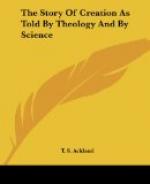1. As regards modifications of organs already existing, the two alleged causes are insufficient to account for the results which we witness, since in each individual case the concurrence of many contingent causes, continued through a long series of ages, is required to produce the result. But the probabilities against such, a concurrence in any one case are enormous, and against their concurrence in a large number of cases the chances are practically infinite.
2. That such causes do not at all account for cases in which an entirely new organ is developed, such as mammary glands—or for the case of man, in which intellectual superiority is accompanied by a loss of physical power.
3. That from the nature of the case it is impossible for us to ascertain that natural or sexual selection has ever acted to produce a single modification, however small, and that the results of man’s superintendence have not as yet passed beyond certain narrow limits, so that there is no justification for the assumption that such modifications are capable of being carried to an unlimited extent.
We see that in the only case in which change is known to have been brought about, it has been the result of choice and design. If then there is a probability that choice and design may have been exercised by a power higher than man, there is no longer any reason to doubt but that results much greater than any to which man can attain may have been brought about by the same means. And in fact the advocates of the theory of development do virtually admit the existence and action of such a power, whenever they have recourse to assumed “laws” to account for phenomena for which their naked theory can give no reason. For, as has been shown, law, if it is to be assigned as an efficient cause, and not merely as the statement of observed facts, can only be regarded as the expressed and enforced will of a higher power. And there was no reason why those minute variations themselves, which are the basis of Mr. Darwin’s hypothesis, should be considered casual. Instead then of natural selection, or sexual selection, let us suppose that the selection took place under the superintending care of the Creator, and was directed towards the carrying out of His designs, and then we shall have no reason to doubt but that all results which consisted only in the modification of existing organs may have been obtained by the operation of those laws which we term natural, because they express modes of operation with which we are so familiar that we look upon them as automatic.
But there are other results for which no natural laws with which we are acquainted will thus account. Just as no mechanical laws within our knowledge will account for the rotation of the earth, so no physiological laws yet discovered will account for the changes when totally new orders of being came on the stage—when the course of life took, as it were, a new point of departure. But it is precisely at these points




